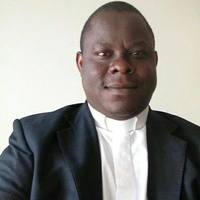- Fr Jude Orakwe is a graduate of the Pontifical Institute of Sacred Music Rome where he measured principally in Gregor... moreFr Jude Orakwe is a graduate of the Pontifical Institute of Sacred Music Rome where he measured principally in Gregorian chant. He had his doctorate in Ethnomusicology from the prestigious Ethnomusicology Institute of Indiana University Bloomington in 2015. He is currently a lecturer in music with the Faculty of Arts of Chukwuemeka Odumegwu Ojukwu University of Anambra State.edit
The author reflects on his work as a music teacher and director in Nigeria wading through the waters of African motion-inclined music to discover a genuine approach to liturgical music making that would be suitable in the African/Nigerian... more
The author reflects on his work as a music teacher and director in Nigeria wading through the waters of African motion-inclined music to discover a genuine approach to liturgical music making that would be suitable in the African/Nigerian setting. In doing this a hermeneutic-critical approach is adopted whereby African music is viewed without bias for what it is and an appropriate adaptation adopted or proposed in order to arrive at the ideal of cosmic liturgy as proposed by Benedict XVI.
Research Interests:
In this conference paper turned into journal article, the author explores the fundamental criteria that must be met by Catholic composers as they exercise their ministry of fostering liturgical music in the Church through their artistic... more
In this conference paper turned into journal article, the author explores the fundamental criteria that must be met by Catholic composers as they exercise their ministry of fostering liturgical music in the Church through their artistic compositional activities. The centrality of the features of liturgical music as enunciated in the pivotally seminal document of St Pius X, Tra le sollecitudini, forms the bedrock for the principles of sacred composition elaborated by the author in this article.
Research Interests:
Adverting to the method of narration and the approach of narrativity, the author, in this brief exposition, chronicles his experience in the field of theoretical and practical study of music, starting with his academic journey in Europe... more
Adverting to the method of narration and the approach of narrativity, the author, in this brief exposition, chronicles his experience in the field of theoretical and practical study of music, starting with his academic journey in Europe and ending up with ethnomusicological studies in America. Further, there's a discourse on the nuanced application he's presently making of the knowledge he gained in his career as a university music lecturer and director of music. The nuance has to do with the system and approach to Africans' study of music in Nigeria, which on the one hand is not too dissimilar to what Nigerians who studied music outside Nigeria experienced in European and American universities but which, on the other hand, cannot be exactly same due to the unique sitz-im-leben of students and departments of music in Nigeria.
Research Interests:
This article examines the how and why of so much retention of the usage of spoken and sung liturgical Latin in Nigeria over and against the gradual disappearance of such time-honored usage in some parts of Europe and America.
Research Interests:
For Rudolf Otto, sacred or religious music serves and ought to function as a medium of connection to God, the wholly numinous Other. This article examines the qualities of the experience of God as the quintessential numinous "mysterium... more
For Rudolf Otto, sacred or religious music serves and ought to function as a medium of connection to God, the wholly numinous Other. This article examines the qualities of the experience of God as the quintessential numinous "mysterium tremendum et fascinans" and inquires on how such qualities could be brought to bear on worship music, in order to render them apt for this experience.
